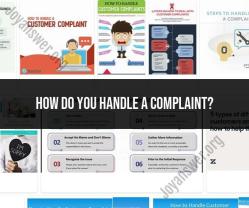How to deal with customers who talk too much?
Dealing with talkative customers can be a challenge, but it's an important skill in customer service. While it's essential to provide excellent service and engage with customers, you also need to manage the conversation effectively to ensure that both you and the customer have a positive experience. Here are some strategies for dealing with talkative customers:
Listen Actively: The first step in managing talkative customers is to actively listen to what they are saying. Give them your full attention, maintain eye contact, and nod occasionally to show that you are engaged in the conversation. This demonstrates respect for the customer and can help them feel heard.
Set Expectations: Politely and tactfully set expectations for the conversation's length. You can say something like, "I'd love to hear more about your experience, but I want to ensure I can help you as efficiently as possible. Can we focus on the main issue you'd like assistance with today?"
Use Positive Reinforcement: Encourage the customer to provide essential details and be concise by using positive reinforcement. For example, you can say, "I appreciate your thorough explanation of the issue. Let's now focus on resolving it together."
Ask Clarifying Questions: To steer the conversation in the right direction, ask clarifying questions. These questions can help you understand the customer's needs better and allow you to provide targeted assistance. For example, "Could you please clarify the specific problem you're facing?"
Empathize: Show empathy by acknowledging the customer's feelings or frustrations. This can help build rapport and reduce the need for the customer to vent excessively. Say something like, "I understand this situation can be frustrating. Let's work together to find a solution."
Use Non-Verbal Cues: Non-verbal cues, such as maintaining a neutral facial expression and avoiding excessive nodding, can signal that you are encouraging the customer to provide only essential information.
Offer Summaries: Periodically summarize what the customer has told you to ensure that you understand their concerns correctly. This not only demonstrates your attentiveness but also helps the customer see that you are making an effort to address their issue.
Set Boundaries Politely: If the customer continues to talk extensively, politely but firmly set boundaries. You can say something like, "I appreciate your detailed explanation. To provide you with the best assistance, I need to focus on addressing your main concern. Is that okay with you?"
Redirect Politely: Gently redirect the conversation back to the main issue or topic. For instance, "I understand that you have had several experiences with our product. To resolve the current issue, let's concentrate on that for now."
Offer Alternatives: If the customer wants to share additional information or stories unrelated to the issue at hand, offer alternatives for them to do so. Suggest contacting customer support through email or another channel where they can provide more extensive feedback.
Stay Patient and Polite: Regardless of the customer's verbosity, remain patient and maintain a polite and professional demeanor. Avoid showing frustration or impatience, as this can escalate the situation.
Escalate if Necessary: In rare cases, when the customer's excessive talking hinders your ability to assist effectively, consider escalating the issue to a supervisor or manager who can handle the conversation more appropriately.
Remember that every customer is unique, and some may require more time and attention than others. The key is to strike a balance between providing excellent service and managing the conversation efficiently. By using these strategies, you can effectively handle talkative customers while ensuring a positive customer service experience.
Managing Chatty Customers: Dealing with Those Who Talk Too Much
Chatty customers can be a challenge for any customer service representative. They may talk about everything but the reason for their call, or they may simply enjoy talking and keeping you on the phone. While it's important to be friendly and attentive to all customers, there are a few things you can do to manage chatty customers effectively.
Customer Interactions: Strategies for Handling Excessively Talkative Clients
Here are some strategies for handling excessively talkative clients:
- Be polite and respectful. Even though the customer may be talking too much, it's important to remain polite and respectful at all times. Avoid interrupting them or making them feel rushed.
- Listen actively. Even though you may be eager to get off the phone, it's important to listen actively to the customer. This will show them that you're interested in what they have to say and that you're there to help them.
- Gently redirect the conversation. If the customer starts to go off on a tangent, gently redirect the conversation back to the topic at hand. You can do this by saying something like, "That's interesting to hear, but let's get back to the reason for your call."
- Use closed-ended questions. Closed-ended questions are questions that can be answered with a simple yes or no. Asking closed-ended questions can help to keep the conversation focused and prevent the customer from rambling on.
- Set boundaries. If the customer is talking too much and it's starting to interfere with your ability to serve them, you can set boundaries. For example, you could say something like, "I understand that you have a lot to say, but I need to keep this call moving so that I can help other customers. Can we please stay focused on the reason for your call?"
Providing Excellent Customer Service: Tips for Addressing Talkative Customers
Even though chatty customers can be a challenge, it's important to remember that they are still customers. By following the tips above, you can provide excellent customer service to chatty customers and manage their expectations.
Here are some additional tips for addressing talkative customers:
- Empathize with the customer. Try to understand why the customer is talking so much. Are they lonely? Are they trying to get to know you? Are they feeling anxious or stressed? Once you understand why the customer is talking so much, you can better address their needs.
- Be patient. It's important to be patient with chatty customers. Remember, they may simply need someone to talk to.
- Find common ground. If you can, try to find common ground with the customer. This could be anything from a shared interest to a similar experience. Finding common ground can help to build rapport with the customer and make them more comfortable.
- Use humor. A little bit of humor can go a long way when dealing with chatty customers. A well-timed joke can help to break the tension and make the conversation more enjoyable for both of you.
By following these tips, you can manage chatty customers effectively and provide them with the excellent customer service that they deserve.







